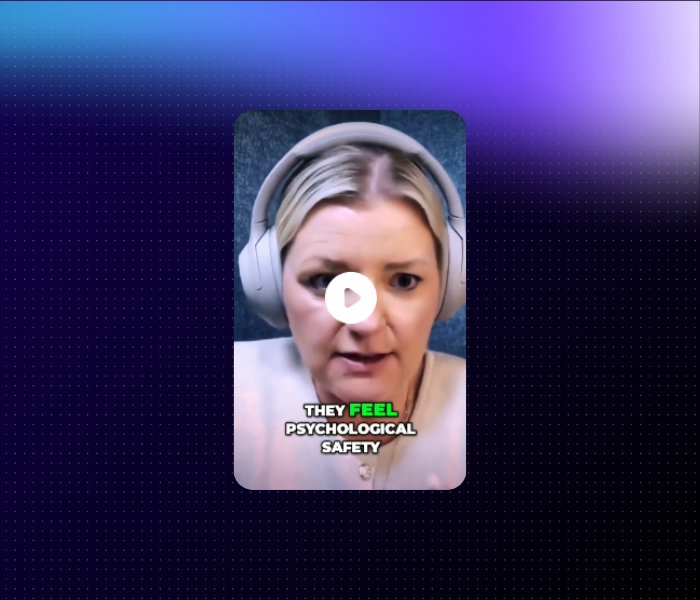How Can Leaders Create Psychological Safety in the Workplace?
In this excerpt from the second episode of the Workplace Visionaries podcast, Jane Young and Joe Harris chat to Bex Moorhouse, the founder of Invigorate Spaces, about what leaders can do to create the psychological safe cultures people want to be a part of.

Everyone wants psychological safety in the workplace, but are we putting the onus on employees and not enough on managers to model the right behaviors day-to-day?
In this excerpt of the Workplace Visionaries podcast, hosts Jane Young and Joe Harris chat with Bex Moorhouse, founder and director of Invigorate Spaces, a London-based wellbeing consultancy that improves workplace culture, experience and environment for companies like JLL and Barclays Bank.
Bex shares what she’s learned about workplace psychological safety in her over 20 years of experience, and why even the smallest things leaders do go a long way for preventing workplace toxicity.
Watch, listen and subscribe on:
"I think it’s by having conversations and building up that space that people feel psychologically safe, and like they can share their truth."
Bex Moorhouse
Joe: Something a lot of people struggle with is imposter syndrome, and Bex, I know you’re advising a lot of leaders in terms of how to create healthy and happy workplaces, and you’re one of the best in the industry at doing that.
How much of this is affecting overall workplace wellbeing – this feeling of well, maybe I’m not good enough, the imposter syndrome from an individual level? How can leaders banish those demons and what can they do from a wellness perspective to help with these sorts of personal anxieties?
Bex: I think it’s by having conversations and building up that space that people feel psychologically safe, and like they can share their truth. But actually, the places where I’ve seen this be really successful is when the manager or the leader turns around and says, “I really struggle with this.”
Watch

If there’s a big talk they’ve got to do, how many managers say, “Oh, I’m nervous about that”? You don’t really hear that. Whatever they’re feeling inside, they’re keeping that to themselves. But actually sharing that humility and that really helps to create that environment where everybody feels okay about it.
At the start of my career I never told anybody anything about all the anxiety and challenges I was facing, I just pushed it down. Keep moving, get through it, you’re gonna be fine.
But I remember being referred to as a machine. My colleagues said, she’s the machine. And I remember feeling at the time like, wow, that’s really good. They think I’m a machine.
That’s not good. The problem is that when the leader doesn’t create that psychological safety and share their truth, then it doesn’t create that environment where you can be happy and healthy together.
"The problem is that when the leader doesn't create that psychological safety and share their truth, then it doesn't create that environment where you can be happy and healthy together."
Bex Moorhouse
And then there’s the silly little things like leaders not taking lunch breaks and leaders sending messages out of hours. People will respond to that because you’d be pretty stupid to not reply to your boss.
So, it’s all these little things that can stack up, more so if somebody’s undergoing stress or anxiety at work. And if they’ve got nowhere to release that, then it either comes out in behaviors which aren’t appropriate or in mental health challenges that are happening for people outside of work.
So I think having those conversations and creating that space for a conversation is probably the number one most important thing that leaders can do.
Jane: Just normalizing that humanity and being comfortable with being vulnerable shows that you don’t have to have this old school leader gravitas of invincibility.
Bex: You don’t always want to tell everybody your life events because sometimes they’re not good. It could be grief or heartbreak that you’re going through. But having a leader or a manager turn around and say, I actually had a really bad week last week or I lost my husband 6 months ago and I still feel really bad about it today – that’s the kind of workplace that I want to foster and be a part of. I’m sure everybody else does as well.
What does the Sunday scaries tells you about your workplace culture?
Get more of Bex's tips on creating psychological safety and workplace cultures that actually care about people. Find and subscribe to Workplace Visionaries on Spotify, Apple Podcasts and YouTube.

Share this post


















